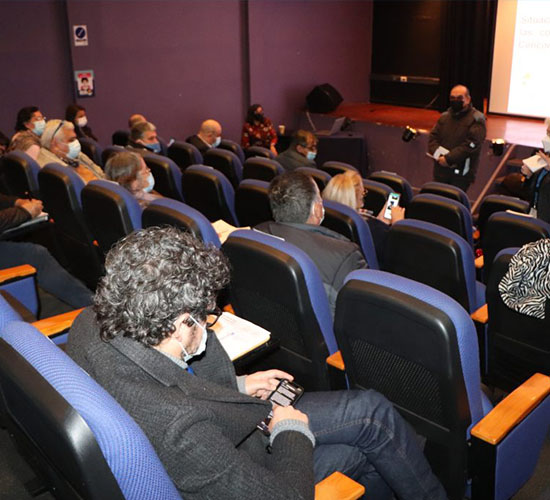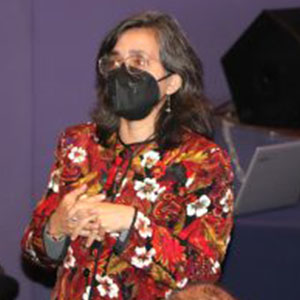Our researcher Sandra Cortés leads the research that seeks to study social determinants of health in Concón, Quintero and Puchuncaví

The study will be developed by the Department of Public Health of the PUC and its objective is to know the prevalence of certain diseases in the population over one year of age in the territory.
In the auditorium of the Department of Municipal Education Administration, -DAEM-, of the commune of Quintero and before the communities and authorities of Concón, Quintero and Puchuncaví and members of CRAS, the Undersecretary of Public Health, Christopher Square, gave the go to the study called "Health Situation of the inhabitants of the communes of Quintero-Puchuncaví-Concón, associated with determinants of health 2022".
The initiative will be developed by the Department of Public Health of the Pontificia Universidad Católica de Chile with the aim of knowing the prevalence, characteristics and risk factors for diseases, in a sample statistically represented in the population over one year of age of these communes, in total 1267 people, of 221 apples. This through an epidemiological-environmental survey; assessment of respiratory function; laboratory tests, among them, liver profile, Lipid, blood count and glycemia, and metal biomonitoring (blood lead and arsenic in urine).
The participation of the selected persons is voluntary and will materialize through the signing of an informed consent.
In this respect, the Undersecretary of Public Health, Cristóbal Cuadrado pointed out that "it has been a long-awaited study on the health situation of the three communes of Quintero, Puchuncaví and Concón, in which we will be analyzing the different effects on health that prolonged pollution in the area could have had. Let's study heavy metals like lead, arsenic, but also other common health conditions, respiratory situations, among others. In this way, this study is going to be very useful, it will be developed for a year and will provide us with high quality information to be able to measure what are the main health problems of the community, from this we will be able to design an organized response of the health system, identify what kind of investment we need to make in the area to improve access to primary care, to the hospitals in the area, to respond in a timely manner to the needs that long-standing exposure to pollutants in the area may have generated", Pointed out.
 Dr.. Sandra Cortés, professor of the Department. of Public Health of the PUC and researcher responsible for the study explained that a communication campaign will be deployed to invite the community to participate in a complete evaluation of their state of health that will be carried out by very well trained people from that university. "We hope to recruit people who have lived at least 5 years in the commune and we are going to take a blood sample from them, a urine sample to know your state of health with clinical parameters more related to sugars, fats; plus a couple of quizzes about your residential history, in the case of adults, and your work history. Also, we are going to do tests of respiratory function and with that we are going to calculate different parameters that will have a communal representativeness, that means that they will give an image of what are the most important diseases that occur in the population of these three communes and what social factors, of the environment, of your residential or work history have to do with your current state of health".
Dr.. Sandra Cortés, professor of the Department. of Public Health of the PUC and researcher responsible for the study explained that a communication campaign will be deployed to invite the community to participate in a complete evaluation of their state of health that will be carried out by very well trained people from that university. "We hope to recruit people who have lived at least 5 years in the commune and we are going to take a blood sample from them, a urine sample to know your state of health with clinical parameters more related to sugars, fats; plus a couple of quizzes about your residential history, in the case of adults, and your work history. Also, we are going to do tests of respiratory function and with that we are going to calculate different parameters that will have a communal representativeness, that means that they will give an image of what are the most important diseases that occur in the population of these three communes and what social factors, of the environment, of your residential or work history have to do with your current state of health".
For its part, the Seremi of Health of the Region of Valparaíso, Mario Parada Lezcano added that "this study will be complemented by a census study of the population of children, girls and adolescents from the three communes; and will also be complemented by another study, retrospective to specifically search for events related to neurological diseases, oncological and respiratory. All this battery of very rigorous investigations will allow to deepen the diagnosis and have a clear panorama of all the affectation of the community to better implement the public policies that exist and implement new policies that allow transforming this area into a recovery zone ".
About the study to be implemented, the director of the Department of Health of the Municipality of Quintero, Ania Guajardo maintained that, "from the point of view of health it is very important to be able to make an epidemiological profile of the commune, with the characteristics of our community".
While the counselor of the CRAS and president of the Communal Union of Urban Neighborhood Boards of Quintero, Victor Azócar, while positively appreciating the implementation of the study, he said that, "We have been fighting for this for 3 to 4 years., in fact, I made it appear that 2 years ago he had already fallen off the platform due to lack of money".
COMMUNITY OPINION
The news was very well received by various members of the local community, such as Dominique Claise, member of the MUZOSARE group. "I'm very happy because it looks like it's finally going to be real., we have always waited. There was a tender before but it never bore fruit, it seems that now there is the political will. You have to trust all these super qualified people.", said the activist.
On the other hand, Rene Cuello, President of the JJ. VV. El Mirador and member of the Council for Environmental and Social Recovery (Cras) of Concón- Quintero-Puchuncaví, said that this study "we have longed for many years ago, we have worked for this and we are glad that the Government and the authorities have listened to us and that at this moment it is being concretized. We will try to help them and continue. I was also glad that the Seremi told us that the children with cancer and rare diseases that are now there are going to be made visible."
The prevalence study will be conducted by a team of 40 people from puc for one year and hopes to have the support of the community and local institutions.. For more information the contact email is epiambiental@uc.cl.
